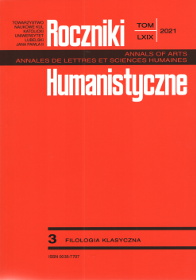Patient-Centered Care in the Light of Contemporary Methodological Approaches, Selected Hippocratic Writings, and Ruphus’ from Ephesus Quaestiones Medicinales: An Outline of the Issue
Abstract
The Hippocratic writings show that ancient medicine focused its diagnostic and therapeutic efforts on the patient to a high degree. However, Rufus of Ephesus, an author from the 2nd century A.D., shows that listening carefully to the patient is no less important in medicine than taking into account his existence’s external and internal conditions. Making the patient a unique partner in the pursuit of improving the quality of their health also enhances their quality of life. Moreover, modern medical humanities strongly emphasize the fact that taking into account the biopsychosocial aspects of patient care strengthens the principle that in any case, it is the person who should be in the center of therapeutic care. His life and health constitute the overriding goal of any medical intervention.
References
Charon, Rita. „Narrative Medicine: Form, Function, and Ethics”. Annals of Internal Medicine, t. 134, nr 1, 2001, ss. 83-87.
Charon, Rita. „Narrative medicine: Attention, representation, affliation”. Narrative, t. 13, 2005, ss. 261-270.
Deveguele, Myriam. „Słowo wstępne”. Umiejętności komunikowania się z pacjentami, red. Jonathan Silvermann, Suzanne Kurtz i Juliet Draper. Tłum. Magdalena Lewandowska, Medycyna Praktyczna, 2018, ss. 9-11.
Epidemie. Księgi I i III Hipokratesa oraz w greckiej i rzymskiej historiografii od starożytności do wczesnego średniowiecza. Tłum. Judyta Krajewska i Anna Głusiuk, Wydawnictwo Naukowe UKSW, 2016.
Epstein, Ronald, i Richard Smith. „The Values and Value of Patient-Centered Care”. Annals of Family Medicine, t. 9, nr 2, 2011, ss. 100-103.
Gärtner, Hans. Rufus von Ephesos. Die Fragen des Arztes an den Kranken. Teubner, 1962.
Gärtner, Hans. Rufus Ephesius, Quaestiones Medicinales. Teubner, 1970.
Hippokrates. Wybór pism. Tłum. Marian Wesoły, Prószyński i Spółka, 2008.
Jaeger, Werner. Paideia. Formowanie człowieka greckiego. Tłum. Marian Plezia i Henryk Bednarek, Aletheia, 2001.
Jones, William H.S. Hippocrates Collected Works I. Cambridge University Press, 1957.
Jouanna, Jacques. Hippocrates. Tłum. Malcolm B. Debevoise, Johns Hopkins University Press, 1999.
Langholf, Volker. „Structure and Genesis of Some Hippocratic Treatises”. Magic and Rationality in Ancient Bear Eastern and Craeco-Roman Medicine. (Studies in Ancient Medicine, t. 27), red. Manfred H.F.J. Horstmanshoff i Marten Stol, Brill 2004, ss. 219-275.
Letts Melinda, Questioning the Patient, Questioning Hippocrates: Rufus of Ephesus and the Limits of Medical Authority, Diss., London 2015.
Letts, Melinda. „Questioning the Patient, Questioning Hippocrates: Rufus of Ephesus and the Pursuit of Knowledge”. Homo Patiens–Approaches to the Patient in the Ancient World. (Studies in Ancient Medicine, t. 45), red. Georgia Petridou i Chiara Thumiger, Brill, 2016, ss. 81-103.
Nutton, Vivian. Ancient Medicine. Routledge, 2004.
Siwicka, Małgorzata. „Humanizm greckiej medycyny Hippokratesa jako wzorzec dla medycyny współczesnej”. Socjologia medycyny w multidyscyplinarnych badaniach humanizujących biomedycynę, red. Michał Skrzypek, Wydawnictwo KUL, 2013, ss. 121-151.
Steward, Moira, Judith Belle Brown, Allan Donner, Ian R. McWhinney, Julian Oates, W. Wayne Weston i John Jordan. „The Impact of Patient-Centered Care on Outcomes”. The Journal of Family Practice, t. 49, nr 9, 2000, ss. 796-804.
Szawarski, Zbigniew. Mądrość i sztuka leczenia. Wydawnictwo słowo/obraz/terytoria, 2005.
Szumowski, Władysław. Historia medycyny filozoficznie ujęta. Sanmedia, 1994.
Turasiewicz, Romuald. „Corpus Hippocraticum i jego ‘tajemnice’”. Meander, t. 59, nr 3/4, 2004, ss. 159-171.
Turasiewicz, Romuald. „O przysiędze Hipokratesa inaczej. Pytania, zagadki, nieporozumienia”, Meander, t. 48, nr 4/6, 1993, ss. 213-232.
Wee, John Z. „Earthquake and Epilepsy: The Body Geologic in the Hippocratic Treatise On the Sacred Disease”. The Comparable Body. Analogy and Metaphor in Ancient Mesopotamian, Egyptian, and Greco-Roman Medicine. Studies in Ancient Medicine, vol. 49, red. John Z. Wee, Brill, 2017, ss. 142-167.
Copyright (c) 2021 Roczniki Humanistyczne

This work is licensed under a Creative Commons Attribution-NonCommercial-NoDerivatives 4.0 International License.





